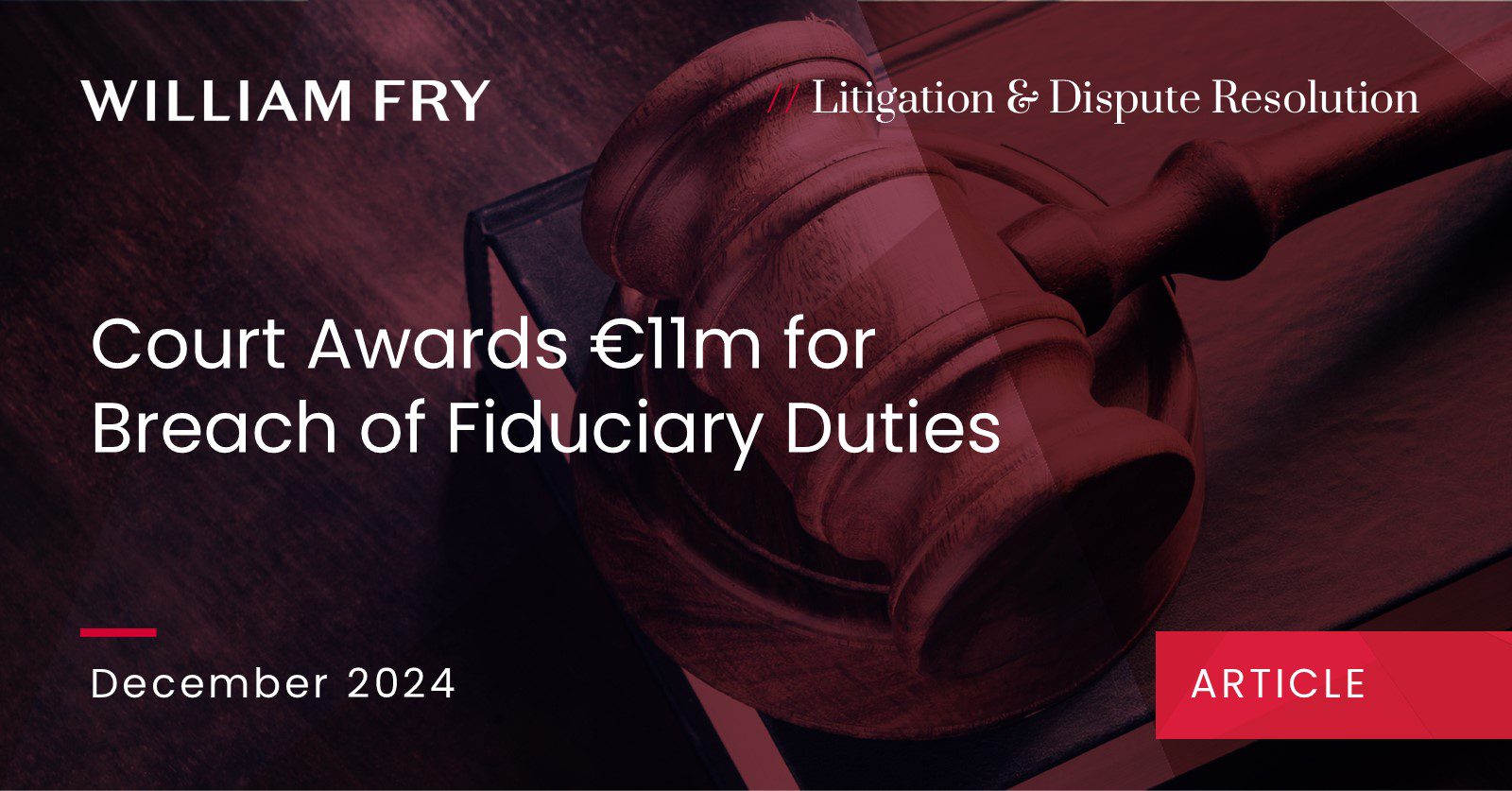The High Court has ordered Patrick Cox to pay five plaintiff firms €11.3m in a dispute centred on concealment of a valuable development opportunity in Dublin (Opportunity).
Mr Cox learned of the Opportunity in February 2014 while he was employed in the O’Flynn Group of companies, and providing consultancy services to Victoria Hall Management Limited (VHML). He did not disclose the Opportunity, which comprised the development of student accommodation, to the O’Flynn Group and instead pursued the project through his own companies.
The O’Flynn Group alleged that Mr Cox concealed and diverted the Opportunity for his own benefit and that he appropriated confidential documentation relating to the group.
A core issue in this case was the submission that Mr Cox owed duties of fidelity and loyalty to the O’Flynn Group under an employment contract. Whether Mr Cox carried out his functions for the group pursuant to an employment contract or in a different capacity was disputed. The O’Flynn Group claimed that Mr Cox owed fiduciary duties “arising from his senior and trusted role.”
The Fiduciary Question
The High Court (Court) relied on the Australian case of Oliver Hume South East Queensland PTY Limited v Investa Residential Group PTY Limited [2017] FCAFC 141, where Greenwood J stated that the “categories of fiduciary are not closed”. The Court adopted this principle and found that fiduciary obligations can “flow from the evidence of one party reposing confidence in the other, who in turn gains both confidence and influence”. The Court found that the party gaining this confidence and influence cannot profit from this abuse of position and that the correct approach to deal with this question is to examine the circumstances of the relationship and the conduct of the parties instead of focusing on the distinction between an employer and consultant.
Based on this, the Court found that the evidence showed that the O’Flynn Group vested trust and confidence in Mr Cox which made them vulnerable to his commercial actions, and hence, he owed them the following fiduciary duties;
- not to compete with the plaintiffs without their informed consent,
- to disclose to the plaintiffs any opportunity which came to his attention in the sector in which the plaintiffs conducted business and in which, the plaintiffs were seeking new opportunities,
- not to divert such opportunities and the profits thereof for his own benefit and the benefit of others, and
- to respect the confidentiality of business records and information of the plaintiffs, and not to divulge such information to others, without their informed consent.
Breach of Confidence
The plaintiffs further alleged that Mr Cox took confidential information and documents and used them to progress the project.
The Court referred to the decision of the Irish Supreme Court in Mahon v Post Publications Ltd [2007] 3 IR 338, where Fennelly J summarised earlier authorities that established what is required to succeed in a case of breach of confidence, as follows;
- information must “have the necessary quality of confidence about it”;
- information must have been imparted in circumstances conferring an obligation of confidence, and
- there must be an “unauthorised use of that information to the detriment of the party communicating it”.
In circumstances where Mr Cox was not the plaintiffs’ employee, the Court referred to a broader equitable principle cited in House of Spring Gardens v. Point Blank [1984] IR 611, “that he who has received information in confidence shall not take unfair advantage of it”.
Against this background, and considering the evidence, the Court found that while much of the information taken was confidential and was taken without the owners’ permission, the Mahon criteria were not satisfied because of the lack of clarity regarding the true ownership of the documents. Although no standalone remedy could be granted for breach of confidentiality, the Court found that this breach contributed to Mr Cox’s overall gross disregard for basic obligations and constituted a breach of fiduciary duties rather than just a confidentiality obligation.
Conclusion
The Court’s findings highlight the importance of the principle that fiduciary duties are not automatically assumed based on one’s position as an employee or consultant but are established through the trust and confidence placed in an individual by their employer. This approach is consistent with the broader legal framework governing fiduciary duties, which arise from the level of trust and confidence placed in an individual, rather than their formal employment status.
Contributed by Caitlin Devitt.



